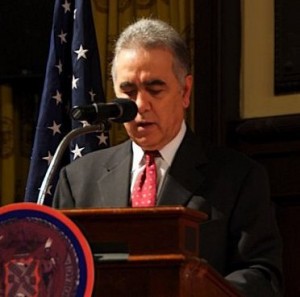European Court of Human Rights Intervenes in Artsakh Conflict
European Court of Human Rights Intervenes in Artsakh Conflict –
Harut Sassounian
BY HARUT SASSOUNIAN
It is noteworthy that the European Court of Human Rights (ECHR) is holding simultaneous hearings on two rival lawsuits filed by Armenians and Azerbaijanis. Is this a mere coincidence or an attempt by the Court to intervene in a thorny dispute that political leaders have failed to resolve for over 25 years?
This week, ECHR is hearing the case of “Sargsyan vs. Azerbaijan,” dealing with Minas Sargsyan’s complaint against the Republic of Azerbaijan, claiming that he was forced to flee his Gulistan home in the Shahumyan region, after his property was destroyed by Azeri armed forces in June 1992. The Sargsyan case was first filed with ECHR on August 11, 2006. Interestingly, the Court held hearings on both the Armenian and Azerbaijani complaints on the same day: it heard the “Chiragov and Others vs. Armenia” case in the morning of September 15, 2010, and later that afternoon, the “Sargsyan vs. Azerbaijan” case.
In a preliminary decision on December 14, 2011, ECHR found Sargsyan’s complaint to be partly admissible. The Court rejected Azerbaijan’s contention that the case should be dismissed because it covered events prior to Azerbaijan’s ratification of the European Convention on Human Rights in 2002. Unfortunately, applicant Minas Sargsyan passed away in 2009, but his two children are continuing the complaint. ECHR will further probe the merits of the Sargsyan case during its February 5, 2014 hearing.
Two weeks earlier, ECHR heard the rival case of “Chiragov and Others vs. Armenia,” in which six Azerbaijani Kurds had filed a complaint against the Republic of Armenia. They claimed to be unable to return to their homes and properties in the Lachin district since May 17, 1992, having been forced to flee because of the Karabagh (Artsakh) war.
The Azeri complaint against Armenia was first filed with ECHR on April 6, 2005. In a preliminary decision on December 14, 2011, ECHR agreed to take up the case, finding that the ongoing negotiations between Armenia and Azerbaijan did not preclude the Court from dealing with this contentious situation. ECHR held a subsequent hearing on January 22, 2014, to consider the following questions:
1) does Armenia exercise effective control over the territory of Artsakh?
2) do the six Azeri citizens possess sufficient documentation proving their identity and ownership of the claimed properties?
3) should the Azeri applicants have exhausted all domestic remedies (ECHR requirement) by applying first to Artsakh courts prior to filing a complaint with ECHR, considering the further complication that Artsakh is not a recognized state?
Here are some thoughts about ECHR’s crucial role in these two conflicting cases:
1. Both complaints were filed with ECHR almost 10 years ago and cover alleged human rights violations that had occurred over two decades earlier. Since the Armenian applicant and one of the six Azeris had died in the intervening years, neither one will ever see the justice that they had sought from the European Court. As the popular saying goes, “justice delayed is justice denied!”
2. ECHR’s obvious effort to take simultaneous action on these two separate yet opposing cases indicates that the Court might be trying to resolve not only these two complaints, but also lay the groundwork for the resolution of the Artsakh conflict, at least the refugees’ right to return to their homes.
ECHR’s even-handed treatment of Armenian and Azerbaijani applicants thus far would lead one to believe that the Court would eventually rule in favor of both cases opening the door to thousands of additional complaints from refugees on both sides who suffered a similar fate during the Artsakh war. Since all member countries of the European Council are obliged to comply with ECHR’s decisions, the Court may order that these refugees be allowed to return to their native homes, thereby imposing a partial humanitarian solution on an intractable conflict that the leaders of both countries and international mediators have been unable to resolve for over 25 years!

